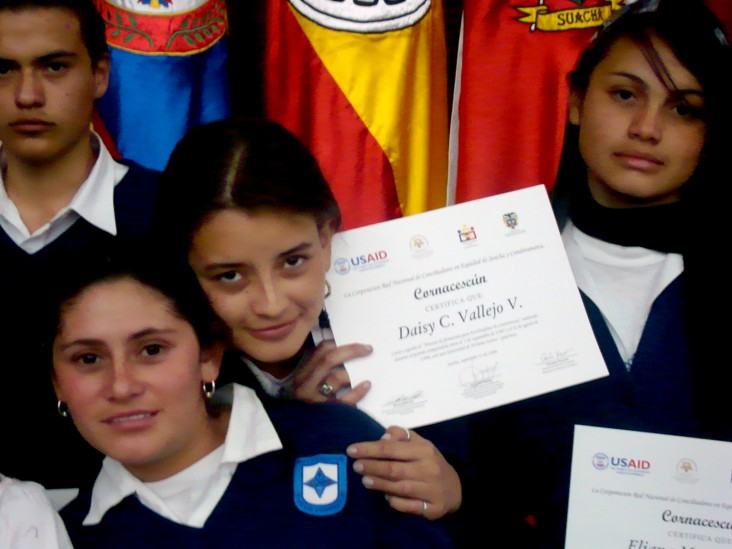
Residents of Soacha, Colombia, and the surrounding areas learned to resolve their differences through mediation thanks to an award-winning USAID-supported program.
For more than 20 years, water distribution was a problem in the Cazucá highlands located in Soacha, a municipality in the outskirts of Bogota. Being a plumber had become one of the most dangerous jobs in an area where everyday common crime combines with armed rebel group presence and extreme poverty. Due to the lack of an adequate system for drinking water, clean water became one of the most sought after goods and a main motive for conflict.
“There were intolerant people that did not realize the water shortage was caused due to the lack of an aqueduct, and blamed the plumber handling the supply valves,” said Álvaro Huertas, an equity mediator in the region.
Faced with the water situation, the National Network of Equity Conciliators Corporation of Soacha and Cundinamarca (CORNACESCUN for its Spanish acronym) was established to resolve the problem. With USAID assistance, CORNACESCUN implemented a project aimed at raising community awareness about the benefits and objectives of the legal process of mediation. The awareness strategy included the implementation of 12 equity-conciliation traveling missions (one per month) and 100 door-to-door visits (on average nine per month). Additionally, 100 workshops on coexistence were carried out by local mediators within their own communities.
The water dispute case is one of hundreds resolved by the equity conciliators. “Our organization was born in the Cazucá highlands. Almost five years ago, we held a mediation hearing where 40 representatives from seven neighborhoods attended, and where we reached agreements on hours and shifts for the provision of water to each neighborhood. Today, every time a problem arises on the matter, the minutes from that hearing are brought out to remind people of what was agreed on. The people have learned to uphold the agreements made regarding the distribution of water,” Huertas said.
CORNACESCUN has been so successful that in October 2008 it received the second place award from the Excellence in Justice Corporation - the most well-known Colombian non-governmental organization advocating for a more efficient administration of justice in the country - recognizing its successful collective case resolution methods. Prompted by USAID, the CORNACESCUN volunteers have helped prevent thousands of Soacha’s community conflicts from becoming formal court cases or from resulting in physical confrontations. Although smaller conflicts persist, Álvaro Huertas and the other 67 conciliators will continue their voluntary work to ensure respect and fair dealings among the residents of the Cazucá highlands.







Comment
Make a general inquiry or suggest an improvement.